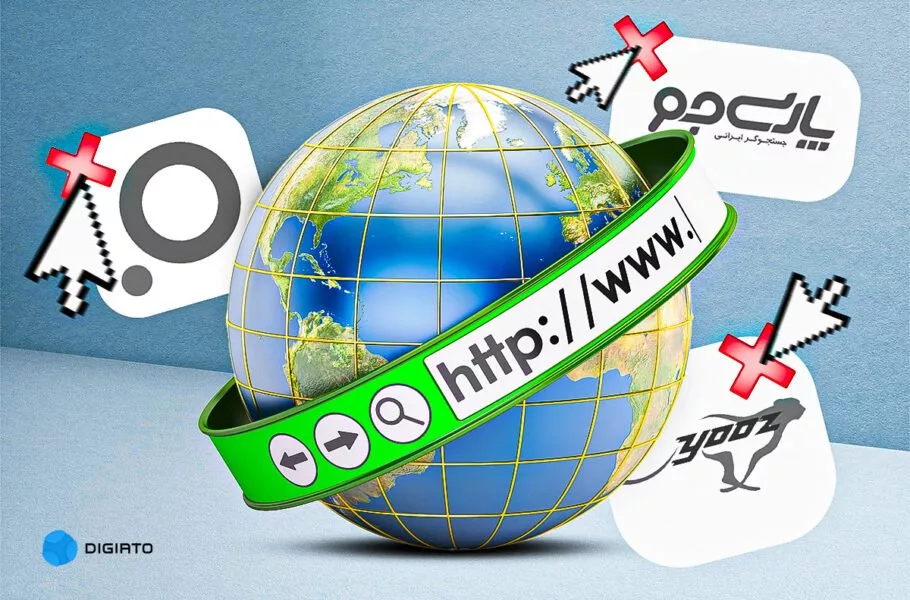
Search Engines That Never Found Their Way: A Costly 15-Year Pursuit of a National Search Engine
A look at Iran's ambitious yet unsuccessful attempts over 15 years to develop homegrown national search engines.
"We will build a national search engine", a vision that has captivated Iranian authorities since the late 2000s. Over the years, substantial budgets have been allocated to this ambitious goal, yet today, neither the funds nor any tangible outcomes from these grand projects are evident.
Despite past failures, the government appears undeterred and is once again pursuing the development of another "national search engine." On August 18, 2025, Mohammad Hassan Sadr, head of Iran's Information Technology Organization, announced plans for a national operating system and search engine as part of the National Information Network initiative in collaboration with private sector firms. In light of these developments, Digiato reviews the government's 15-year struggle to establish a homegrown search engine and its lackluster results.
Ya Haq: The National Search Engine with Limited Features
Fifteen years ago, in August 2010, then-Minister of ICT Reza Taqipour announced plans to launch a "national search engine," which was even included in Iran's Fifth Development Plan. Taqipour emphasized that Iran needed a local search engine to ensure that domestically generated information could be shared globally without censorship or commercial bias. He also noted that another goal was to compete with international search engines that often exclude or manipulate rankings of local content.
Following these statements, Hadi Malekparast, then Director-General of Research and Development at Iran's IT Company, introduced the name "Ya Haq" for the proposed search engine, a deliberate nod to compete with Yahoo. However, it was clarified that this name was not final.
One unique feature touted by Malekparast was limiting search results to a maximum of 40 items to prevent users from being overwhelmed by thousands of pages.
Although discussions about Ya Haq persisted for years, it never materialized. The idea of a national search engine has since resurfaced under various names across different administrations.
Parsijoo: A Wasted Opportunity
Around the same time Ya Haq was proposed, a team at Yazd University began developing another search engine called Parsijoo. Its beta version launched in 2010, followed by an official release in 2012. Parsijoo marketed itself as an independent search engine that did not rely on other platforms' results and claimed its crawling, indexing, and ranking were performed entirely on its own servers using proprietary algorithms.
By 2014, Parsijoo had received significant support from Iran's Ministry of Communications, 150 servers and financial aid for bandwidth and operational costs were provided.
However, despite these investments, Parsijoo's search results were often inaccurate or censored. During the nationwide internet shutdown in November 2019 when only domestic services were accessible, Parsijoo failed to meet user needs effectively. At the time, Amirali Kheirandish, Chairman of Parsijoo's Board of Directors, described this shortcoming as "natural." Ultimately, Parsijoo ceased operations in August 2022.
Gorgor, Yooz & Others: Short-Lived Ventures
Encouraged by government support for local initiatives like Parsijoo, several other projects emerged over time but failed to gain traction or achieve sustainability. One such project was "Gorgor," launched in February 2015 alongside Parsijoo and funded by part of over 1.7 trillion rials allocated by the Ministry of Communications for domestic search engines during that period.
Despite receiving substantial financial backing from authorities including Baratt Ghanbari (then Deputy Minister for Planning), Gorgor followed similar strategies as its predecessors, retrieving results from established global engines while filtering content for Iranian users, and ultimately faded into obscurity.
Another example is "Yooz," introduced in 2014 as Iran's first official national search engine at a reported cost exceeding $16 million (7 billion tomans). However, as revealed by Amir Nazemi (former head of Iran’s Information Technology Organization), Yooz was managed by groups affiliated with Imam Hossein University under IRGC supervision; decisions about its future rested solely within their purview after state funding ended abruptly due to poor performance issues reported throughout its six-year lifespan before shutting down quietly in 2021.
Zarebin: A Struggle Even for Telecom Giants
Shortly before Yooz’s demise came "Zarebin," launched by Hamrah-e-Aval Company (MCI), Iran’s largest telecom operator. While still operational today, it suffers from limited features and unsatisfactory performance levels, indicating even industry leaders face challenges breaking into competitive markets dominated internationally by tech giants such as Google.
Among these prominent names are countless others, including early pioneers like "Parsik" which shifted focus entirely, or defunct ventures such as "Salam." Many attempted entry into what has proven repeatedly an unforgiving domain where failure seems inevitable given current constraints faced domestically within both technical capabilities & regulatory frameworks alike.
Why Do Iranian Search Engines Fail? Why Does The Government Persist?
In recent years, a wave of successful local services, ranging from ride-hailing apps and navigation tools to video-on-demand platforms, has seamlessly integrated into the daily lives of Iranians, enjoying widespread public adoption. Yet, despite substantial investments and resources poured into developing domestic alternatives to global counterparts, these efforts consistently fall short of delivering real value to users. Most are ultimately abandoned after repeated setbacks, plagued by unsustainable business models and a reliance on recycled ideas rather than genuine innovation.
Compounding these challenges are pervasive censorship and limitations in data, software, and hardware, which severely hinder the ability of local platforms to compete internationally or provide accurate, comprehensive, and relevant search results. The lessons of the past decade and a half suggest that new entrants are unlikely to outperform their predecessors if they continue to prioritize profit over progress.
Nevertheless, the Ministry of Communications remains steadfast in its pursuit of this flawed trajectory, driven by obligations outlined in the National Information Network Master Plan, as mandated by the Supreme Cyberspace Council. The deployment of foundational internal applications, especially social messaging platforms and search engines, remains a top priority. Yet, the massive financial losses incurred so far appear to have done little to deter further spending. Under the current administration, future initiatives seem poised to repeat past mistakes, doubling down on a failed strategy that ultimately burdens taxpayers with the cost.












